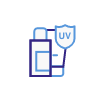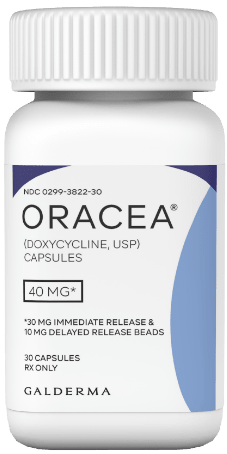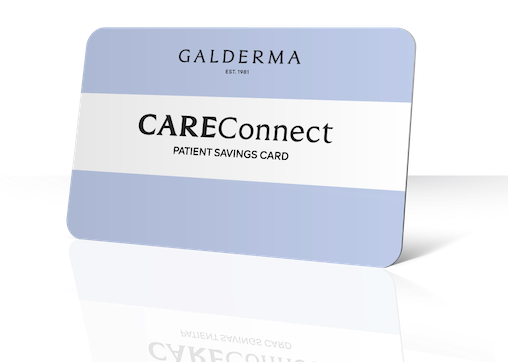

TAKE CONTROL
What is rosacea?
If you’ve been experiencing facial redness, blushing, or small bumps and blemishes that resemble acne, you could be one of 16 million Americans with rosacea,
a chronic inflammatory skin disease. You know that it not only impacts how you look, but it can affect how you feel as well


Everyone’s rosacea is unique, and your treatment should be too!
Your best bet to help achieve clearer skin is by working with your dermatologist to get a formal diagnosis and set your treatment goals together
Over-the-counter rosacea treatments may not have given you the results you were looking for in the past, and if left untreated, your rosacea may get worse. The sooner you work with your dermatologist to seek the right treatment, which may include a prescription, the sooner you may achieve clearer skin
Making the switch to an effective prescription treatment that is right for you may improve your symptoms of rosacea. The time to act is now!
Guide the discussion with your dermatologist, and start your journey to help achieve clearer skin today

Tips and tricks
Looking for tips and tricks to help manage your bumps and blemishes of rosacea?

Effective treatment
Learn more about an effective rosacea treatment that is safe for long-term use*

Resources
Your go-to rosacea resource for up-to-date information, news, and insights

“Better control over the bumps and blemishes of my rosacea helps me feel better when I interact with customers. Now I’m back doing what I love the most”


ROSACEA TRIGGERS
What can cause rosacea flares?
Treatment is only one part of your journey. Understanding your triggers is an important aspect of helping to manage the bumps and blemishes of your rosacea for the long term*




KNOW THE DIFFERENCE
Acne or rosacea?
As the bumps and blemishes of rosacea can resemble acne, the two skin conditions are often mistaken for each other. While the symptoms may be similar, knowing what to look for will help you distinguish between the two

STAY CONNECTED
Sign up and
stay up-to-date
Sign up here to receive updates and useful information to help better understand your rosacea
Important Safety Information
Indication: ORACEA® (doxycycline) 40 mg* capsules are indicated for the treatment of only inflammatory lesions (papules and pustules) of rosacea in adult patients. ORACEA does not lessen the facial redness caused by rosacea. Adverse Events: In controlled clinical studies, the most commonly reported adverse events (>2%) in subjects treated with ORACEA were nasopharyngitis, diarrhea, hypertension and sinusitis. Warnings/Precautions: ORACEA should not be used to treat or prevent infections. ORACEA should not be taken by patients who have a known hypersensitivity to doxycycline or other tetracyclines. ORACEA should not be taken during pregnancy, by nursing mothers, or during tooth development (up to the age of 8 years) and may cause reversible inhibition of bone growth. If Clostridium difficile associated diarrhea (CDAD) occurs, may need to discontinue ORACEA. Although photosensitivity was not observed in clinical trials, ORACEA patients should minimize or avoid exposure to natural or artificial sunlight. The efficacy of ORACEA treatment beyond 16 weeks and safety beyond 9 months have not been established.
You are encouraged to report negative side effects of prescription drugs to the FDA. Visit www.fda.gov/medwatch or call 1-800-FDA-1088.
*Based on safety data from a 9-month clinical trial
†Self-administered online survey completed by 710 adult rosacea patients from France, Germany, Italy, UK, Canada and the USA who had been diagnosed by a doctor (declarative), taken a prescribed rosacea treatment in the past 12 months, and visited a doctor at least twice for their rosacea in the past 12 months
‡Self-administered online survey completed by 361 physicians, 300 rosacea patients and 318 psoriasis patients with facial involvement from France, Germany, Italy, Poland, Canada and the USA. Inclusion criteria for patients: adults suffering from at least a moderate disease impact (DLQI ≥6) with a diagnosis of rosacea or psoriasis on the face, taken at least one prescribed treatment for their disease in the past 12 months, and visited a physician at least once for their disease in the past 12 months
§30 mg immediate release and 10 mg delayed release beads
REFERENCES
1. Rosacea: Beyond the visible report. Available at: https://hosted.bmj.com/rosaceabeyondthevisible. Last accessed: September 2021 2. National Rosacea Society 2020. Rosacea Review. Rosacea now estimated to affect at least 16 million American. Available at: https://www.rosacea.org/rosacea-review/2010/winter/rosacea-now-estimated-to-affect-at-least-16-million-americans. Last accessed: September 2021 3. Blount, RW, & Pelletier, AL. Rosacea: a common yet commonly overlooked condition. American family physician. 2002;66(3), 435. 4. Del Rosso JQ, et al. Two randomized phase Ill clinical trials evaluating anti-inflammatory dose doxycycline (40-mg doxycycline, USP capsules) administered once daily for treatment of rosacea. J Am Acad Dermatol. 2007;56(5):791–802. 5. Del Rosso JQ, et al. Comparison of anti-inflammatory dose doxycycline versus doxycycline 100 mg in the treatment of rosacea. J Drugs Dermatol. 2008;7(8):573–576. 6. Pelle, MT, Crawford, GH, & James, WD. Rosacea: II. therapy. J Am Acad Dermatol. 2004;51(4), 499-512. 7. National Rosacea Society. (2020). All About Rosacea. Available: https://www.rosacea.org/patients/all-about-rosacea. Last accessed: September 2021 8. Steinhoff M, et al. Beyond the Visible: Rosacea and Psoriasis of the face. The BMJ Hosted Content 2020. Available at: https://hosted.bmj.com/rosaceabeyondthevisible. Last accessed: September 2021 9. National Rosacea Society. (2020). Factors That May Trigger Rosacea Flare-Ups. Available: https://www.rosacea.org/patients/rosacea-triggers/factors-that-may-trigger-rosacea-flare-ups. Last accessed: September 2021 10. Preshaw PM, et al. Modified-release sub-antimicrobial dose doxycycline enhances scaling and root planning in subjects with periodontal disease. J Periodontol. 2008;79(3):440–452













